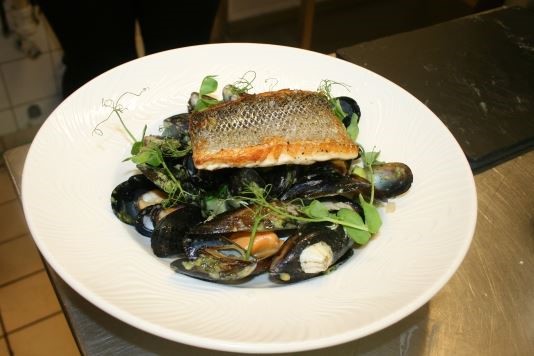Expert seafood cookery tips from top chef Alan White

After sourcing the catch of the day, Matt Brady got a masterclass from the Executive Chef of Brighton's Grand Hotel.
After spending a morning learning about the issues of sustainability affecting the fishing industry, it was time to receive a masterclass from Alan White, Executive Chef at Brighton's iconic Grand Hotel.
He walked me through preparing and cooking lobster, mussels, sea bass and plaice in the cavernous kitchens of the Grand.
Preparing seafood
Filleting fish is the first step. For plaice, two incisions are carved behind the gills to give an ‘edge’ to the fillet, then you draw one more deep line straight down the spine. Next, slip a very sharp knife at a 45° angle behind the gills and bring the knife across the body of the fish to lift off the flesh as one piece.
It’s perhaps easier to watch a video guide to properly understand how to fillet a fish.
Watch Sophie Michell demonstrate the technique on a sea bass
Beware sea bass – it’s delicious, but you need to be careful handling the fish. Alan gingerly lifts up the spines from its back. If you touch them, he says, your hands will just swell up. The fish doesn’t produce any venom, but it’ll dig deep and lingering bacteria on the fish will get into your hand. Not pleasant, so carefully lift up the spines (use gloves if you want) and snip them off with a pair of kitchen scissors.
Cooking seafood
The most important thing to Alan is to “bring elements of the sea back into the dishes” while keeping things simple but delicious. The seafood we’re using has only just got back into port, so that’s just about as fresh as you can get, which is a strong start.
There’s also some wonderful wild garlic pesto, which Alan says is prepared en masse during the picking season, and stored for later use.
Mussels
Alan puts together the first meal, dropping mussels into a pan and steaming them open with white wine (no oil). Samphire, shallots and cucumber are added to the mussels towards the end of cooking, and the pesto mixed in just before serving.
All shellfish arriving in the kitchen come with a 'passport' saying where and when they were caught. Before you cook mussels, tap any open shells with a knuckle. They should close up. If they don't, the mussel is already dead and should be discarded.
After cooking, if any mussels do not open up, you should also discard these. Alan says that any shellfish not cooked and consumed within 24 hours of arrival at the hotel are discarded too, to be sure that all food is edible.
Fish
Meanwhile, the fillet of sea bass is popped into another pan, to simply fry in butter. Once the edge of the fillet changes colour, it is ready to flip. But if it doesn’t lift up straight away, leave it for a few more moments – if you force it, you can tear the flesh.
For more delicate fish, place parchment paper into the frying pan first then your fish, followed by knobs of butter. Hold the fish down flat in the pan, skin first, for a few moments before letting go. This will prevent the fish bevelling up from the pan and become misshapen, which can also affect how quickly different parts of the fish cook.
After your butter has melted, it’s important to stop it from burning. The simple trick Alan uses is just a squeeze of lemon into the pan at the crucial moment, which prevents the butter from cooking, while also adding flavour to the fish.
What’s really difficult and takes practice, says Alan, is finding the sweet spot where the fish is just cooked, and safe to eat, and removing it at that instant. Fish quickly dries out when left too long, and it would be a crime to let this beautiful fresh stuff go bad.
Lobster
Onto the lobster. Not your everyday lunch, but then again, you only live once. Slash down through the head to kill it quickly, then drop it into a pot of boiling water for eight minutes before cutting in half down the middle. Back into the frying pan, flesh down in shallots and butter before seasoning with chives and a splash of white wine. Finish with samphire and serve.
You can see highlights of all those cooking techniques from our trip in the video below.
The Grand Hotel will be offering Fish ‘N’ Trip experiences to guests, where they can see the catch of the day being chosen and then get a cookery masterclass, from £99 starting from 28th July 2015
You might also like:
Shopping for sustainable seafood with Alan White
Video guide: what to look for when you're buying fish
Video guide: how to prepare sea bass
Video guide: how to prepare mackerel
Comments
Be the first to comment
Do you want to comment on this article? You need to be signed in for this feature